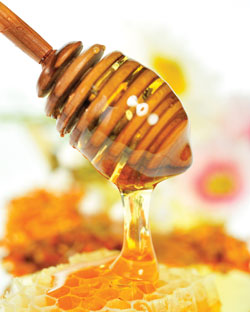Honey laundering: fraud on the shelves?
by Andrew Schneider
This article was originally published in February 2013

The benign memory of Winnie the Pooh shoving his paw into the honey jar has just about faded as federal investigators and the Department of Justice continue to crack down on an almost worldwide network of smuggled, mislabeled and adulterated honey into the United States.
Chinese honey makers became zealous in their efforts to conceal where their honey was being sold about 11 years ago. That’s when the U.S. Department of Commerce imposed a stiff tariff on government-subsidized Chinese honey to stem the massive dumping of the underpriced nectar on the U.S. market.
Now, a decade later, shoppers still can’t be sure what they’re buying off most U.S. grocery shelves. Testing in Europe showed honey was contaminated with heavy metals and illegal animal antibiotics, including chloramphenicol. The same suppliers are bringing honey here.
While most of those arrested, indicted and convicted for the sweet smuggling in the last few years were foreign honey importers and U.S. brokers, federal criminal investigators say it could not be happening without the knowledge and participation of major U.S. packers and distributors.
In November 2011, Seattle-based “Food Safety News” published the results of its laboratory analysis of 60 jars, jugs and plastic bears of honey purchased in 10 states and the District of Columbia.
The honey was examined by Vaughn Bryant, considered by many to be the country’s top melissopalynologist, or pollen investigator. Identifying the source of pollen is the only precise, scientifically accepted method to identify the origin of a honey.
Although the U.S. Honey Board disputes it, the World Health Organization, the European Commission, and dozens of other standard-setting agencies say that the ultra-filtration or removal of all pollen from honey is a sign that it has been adulterated, most likely to conceal its origin.
After repeated testing in his Texas A&M University Palynology Research Laboratory, Bryant reported that depending on what type of store the honey was purchased from, between 76 percent and 100 percent of the samples tested were ultra-filtered.
Several states are in the process of passing laws or regulations establishing a legal definition of honey because the Food and Drug Administration (FDA) has ignored repeated requests to do so. A legal definition could result in a ban on the sale of honey where the pollen has been removed.
Another favorite sweetener that is frequently adulterated is maple syrup. Vermont and New Hampshire consumer experts say that because of bizarre weather conditions, less actual syrup has been harvested and the market price for the real stuff is going up. Bogus product is popping up in many markets.
New products, new fraud
In April 2012, the Institute of Food Technologists’ “Journal of Food Science” reported on what may be the first public database on bogus food and intentional adulteration in our food supply. To compile it, researchers from U.S. Pharmacopeia (USP) reviewed 1,305 records from 677 scientific, professional and scholarly manuscripts. Besides honey, the most reported targets for adulteration were olive oil, milk, saffron, orange juice, coffee and apple juice, according to Markus Lipp, USP’s director for food standards.
The United States is importing more of our food and China is becoming a larger provider, FDA says. The Food Marketing Institute says at least 20,000 new products are offered up to grocery shelves each year. Experts say there is no doubt some of them will have ingredients added, removed or concealed.
USP’s Lipp says consumers should not forget that economically motivated adulteration poses a host of risks to businesses from legal and public health perspectives.
“The sobering reality,” he says, “is that every safeguard in place in our global multibillion-dollar food industry is null and void if one cannot confirm the authenticity of the food ingredients that make up a product. In an industry that touches us all, with so much to lose, that simply cannot suffice.”
Andrew Schneider is a two-time Pulitzer Prize-winning investigative journalist.
